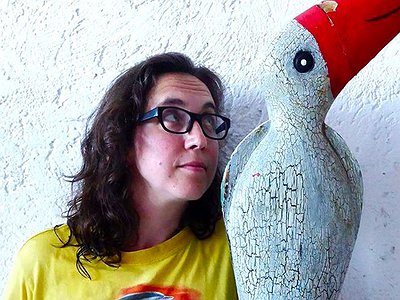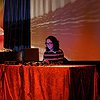Name: Kate Carr
Nationality: Australian
Occupation: Sound artist/Label owner
Current Release: I had myself a nuclear spring on Rivertones
Musical Recomendations: There are four new artists on the latest Tiny Portraits set of singles who are not so well known, so if I can I would like to recommend all four: Jacqueline George, aag, 9T Antiope and Josten Myburgh. You can visit their works and the project at www.flamingpines.com
Website / Contact: If you enjoyed this interview with Kate Carr, you can find more information about her on her website.
When did you start writing/producing music - and what or who were your early passions and influences?
I started making music probably about seven years ago now, maybe a little more. I was doing some DJing, and always was very interested in sound and music, but it was being exposed to the more experimental side of things which got me thinking about making my own material. Big early passions and influences for me were Oval, Ryoji Ikeda and Taylor Deupree, DJ Screw with his super-slowed down woozy mix-tapes and probably minimal techno in some ways also.
For most artists, originality is first preceded by a phase of learning and, often, emulating others. What was this like for you? How would you describe your own development as an artist and the transition towards your own voice?
Well I think in my very early material I was making experimental minimal techno in some ways, but very influenced by glitch, and particularly the glitch of Oval. I loved that slowed down skipping CD sound, and I still find it a very beautiful sound. But I also was very into sine tones, and while perhaps initially more cut up ones like Ikeda uses, over time I turned to longer tones. A year or two after this I began also to slowly incorporate more real instruments into my work and at around this same time I started also to do a lot more with field recordings, so there was a big mix there for a while of very diverse elements. My work has developed out of this very heterogeneous phase into a process of bringing my many sonic interests together into a coherent whole.
I've thought a lot about the themes of my work, in terms of investigations of place and emotionality. My process is now informed more by these themes, whereas in the past I was very taken by particular sounds, or ways of arranging sounds. So while my process has become very open, my sound has become a lot more focused and coherent and perhaps recognisable as something of my own.
What were your main compositional- and production-challenges in the beginning and how have they changed over time?
A lot of the more technical challenges I've faced have been centred on the field recording side of things. What set up to use, what mics, sourcing specialist mics like hydrophones and contact mics, and I guess the trade off between quality and ease of use with particular set ups. But again, here my work has completely changed. I can be romanced by a beautiful pristine recording but this is not really something I strive for any more.
I work in a very spontaneous manner with smaller recorders, and the things I like to record like public transport, airports, music in public spaces, I do on these types of recorders and even on my phone sometimes. I really like the quality or the lack of quality, in my phone takes and I've used these sorts of low-quality recordings extensively in my work. So even though I solved some of my quality issues with my initial set up which had quite a lot of pre-amp noise issues, I use that kit only sparingly now to do specialist things with hydrophones and contact mics.
Tell us about your studio, please. What were criteria when setting it up and how does this environment influence the creative process? How important, relatively speaking, are factors like mood, ergonomics, haptics and technology for you?
My studio is totally chaotic most of the time, but I'm hoping to get things more organised now I've moved house and also cities. In Belfast my studio was also the production room for Flaming Pines' releases so it was a huge mess of cords, and instruments, CDs, the off-cuts of CD sleeves, amps, adapters, three computers, a big printer, all in a very tiny room. I like mess and find it comforting, but that set up became a little too claustrophobic and chaotic even for me!
Now I'm in London and at this moment I'm waiting for all my things to arrive before I can set up my new studio, which is much larger than in Belfast. I'm thinking about how to make it work so it's easier for me to separate the work of the label, from my own practice as a sound artist.
I'm a huge multi-tasker and I like to have a lot of things on the go at once, but sometimes I would find myself recording a take, replying to an email and trying to glue a CD sleeve all at the same time and it was a bit too stressful! For me there is productive chaos, and not-so-productive chaos, so I hope to get the balance right this time around.
In terms of mood, ergonomics, haptics and technology, honestly I can work anywhere and some of my best work I've made in horrible situations just on my laptop with recordings from my phone, or at airports, on planes, in hotels. I like to work in these quite strange places, but I also hope to have my studio as a place of quiet and also sustained sonic investigations, rather than on-the-fly chaos. It will be quite a change for me!
What are currently some of the most important tools and instruments you're using?
I use fruity loops, which I have always used and I use it in an extremely basic way of just triggering samples. I also use guitar fairly extensively, particularly e-bowed drones, and field recordings. Guitar, field recordings and effects are the three main ingredients of my work. I have a great many other instruments also, and in fact I just lost a zither from Slovenia on a train in Croatia which I'm still hoping to get back somehow, but I have a very diverse collection of instruments which I draw upon from time to time, and a huge amount of field recordings I also use.
Many contemporary production tools already take over significant parts of what would formerly have constituted compositional work. In which way do certain production tools suggest certain approaches, in which way do they limit and/or expand your own creativity? Are there any promising solutions or set-ups capable of triggering new ideas inside of you as a composer?
Well I am not so much of a technically-minded composer and these very complex patches, and midi-mapping and other aspects of sonic production like this are not something I have pursued.
I'm interested in them, and I like some of the outcomes of various artists, but for me I don't think in my own work I am so interested in programmed technological processes, even the very open ended ones which aim at introducing randomness into composition and things like that.
I feel like the ideas I have, and the themes I'm pursuing both with my own work and some of the Flaming Pines projects are actually all about relationships, between people, people and place, sound and emotionality and I like to keep things very simple in terms of the processes.
Having said this though, I think in terms of live performance, which is something I'm about to do a great deal more of, there are some technological solutions in terms of interfacing with hardware and things like that which provide performative freedom and spontaneity. I'm looking at a very different set up for my live work than what I use in the studio and although this is somewhat at an early stage I am sure that this process will lead to fruitful changes in my composed work as well.
Could you describe your creative process on the basis of a piece or album that's particularly dear to you, please? Where do ideas come from, what do you start with and how do you go about shaping these ideas?
I usually start with a place and a mood. My most recent album It was a time of laboured metaphors contains three pieces all composed in a very short time while I was staying in a small villa in southern Spain. While I can easily say my work deals broadly with these themes of place, belonging, and not-belonging, dislocation and wistfulness, my work in terms of specific tracks are quite narrative driven and very personal.
So probably I start with a particular scenario in my life at that time, and use the sounds of place to tell a story about that, or to make sense of it somehow. I think of making my pieces perhaps as a way of creating a space in which I can think more clearly, or make a little more sense of this crazy and chaotic world we live in, maybe also as a document which distils a particular place, or person and place, or time somehow.



